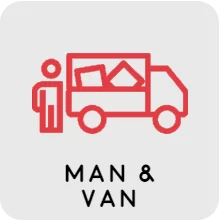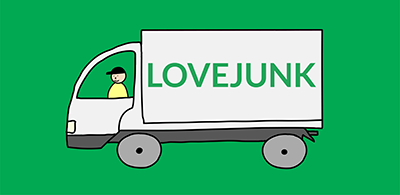Bulky Waste Disposal & Rubbish Collection during Coronavirus (COVID-19)
With so many of us now based at home, the amount of bulky waste coming out of households is arguably higher than ever – as we declutter, home improve and sort out our gardens. However, just like so many other things in our lives, the Coronavirus crisis is significantly affecting bulky waste disposal. It’s become a lot harder than it was to get rid of bulky waste, the likelihood of things being recycled or reused are less, and the situation looks likely to get a lot worse before it gets better.
Below we consider how Coronavirus is impacting disposal of stuff that’s too big for your bin, offer some practical tips for what you can do, look at the latest advice from Government and the waste industry, and also touch on what is happening with household waste in other parts of Europe.
If you have any suggestions or updates for us to include in this blog post, please send them in to [email protected] with the subject line ‘Covid-19 Blog Suggestion’. And we’ll do our very best to incorporate them.
This article covers:
- How is coronavirus affecting bulky waste disposal?
- Three options for bulky waste disposal during the COVID-19 crisis
- Make it easy as possible for waste contractors
- Risk of flytipping is higher – check you’re using a licensed waste carrier
- What about skip hire?
- 72 hour rule
- Government advice for waste disposal if you have Coronavirus symptoms
- What is happening in other EU countries?
- Waste industry guidance
- Need bulky waste collecting?
1. How is coronavirus affecting bulky waste disposal?
Although waste disposal is classified as a ‘key service’, many civic amenity / Household waste recycling centres sites are shut or shutting down to the public. This is because CA / HWRC sites are places that typically tend to attract lots of people in one place operating in close proximity and that makes it much harder to maintain Social Distancing rules.
Social distancing and employee safety is also affecting traditional reuse routes like ebay and reuse charities. The argument is that it just doesn’t seem sensible to risk people’s lives picking up or trading old sofas and appliances. For example, British Heart Foundation – the largest reuse collection organisation in the UK – has suspended its furniture and appliance collection service entirely.
In addition, local authorities are being forced to cut back or stop completely their bulky waste collection services for householders. For example, Gloucestershire, Southwark, and Staffordshire. The reasons given are less about social distancing, and more about operational capacity. As a significant percentage of operatives are off work through self-isolation or quarantine, council services are having to be reduced to their most critical. And naturally collecting people’s old mattress or dishwasher, is not quite as important as taking their general refuse and food waste.
The result is that fly tipping is now seeing a dramatic rise.

2. Three Options for Bulky Waste Collection during the crisis
So, assuming your tip is shut and the council is no longer offering their bulky rubbish collection service, what can and should you do with your old junk in the midst of the COVID-19 crisis?
- The first and easiest option is to STOP creating bulky waste! We appreciate now seems like a great opportunity to clear out your shed, re-landscape your garden or upgrade your kitchen – with so many of us stuck at home with our nearest and dearest and little else to do – but the problem is that home improvement, garden work, and decluttering all creates waste, and that waste needs to be disposed of which in turn requires people to come to your home to collect it, which results in social interaction and hence increased risk of the virus being transmitted to others. Not surprisingly several councils have started urging residents to stop doing DIY. And there is also a second benefit. DIY leads to accidents (particularly if it’s DIY being undertaken by people who don’t normally do DIY!), which means people going to the A&E department at the local hospital – which is something that everyone should be trying to avoid given the current massive strain on the NHS. A point recently made by Oldham’s chief medical officer. So if at all possible, get out your old jigsaw puzzle or duster, but save the waste creation for another day.
- Option 2 if you have created some waste already – or it is waste you just can’t avoid (for example, you’ve had a burst pipe and the works waste from that need disposing of – is to do nothing. Always a great choice for the less decisive of us . Simply, stack it neatly (possibly using some sort of bulk bag or tarpaulin if it’s loose waste, and leave it as out of the way as possible, so children, passers by etc won’t fall over it or hurt themselves with it. And wait until the world gets better and normality resumes.
- The third option is to use a private waste contractor like AnyJunk to remove your waste. Depending on the size, type and urgency you can use a man & van service or hire a skip. If you’d like to read more about the pros and cons of each – then this is a good article.
Note, we haven’t included the environmentally questionable option of burning your waste. Despite the adage that an Englishman’s home is his castle and in fact there are very few laws against people burning pretty much whatever they want in their own garden, we at AnyJunk are definitely NOT advocates of having a bonfire to burn your mattress or old kitchen! Indeed burning any treated wood is bad for the environment and you and your neighbours’ health. Coupled with this is the issue that the country is in the midst of respiratory illness epidemic, so the last thing we should be doing is adding to air pollution! That said, if you have space enough to build a bonfire, then you have space to stack and store the waste until normal services are resumed. So perhaps build the bonfire, but don’t light it – and instead place a tarpaulin over it and wait a few weeks.

3. Make it as easy as possible for Waste Contractors
If you do decide to use a private waste contractor to take away your waste, then please bear in mind their operatives are likely to be just as worried as you about getting the COVID-19 infection. To minimise the risks to them, if at all possible:
- Place all waste outside your home (rather than inside), so it is as easy as possible for them to pick it up without having to enter your premises and or compromise social distancing guidelines.
- Any loose waste – particularly if it is equipment or items that you have handled or sweated on (such as gloves or masks) – should if possible be placed in plastic bags that are tied shut
- The third thing you can do to help, is to break large items down (or exclude them from the collection all together), so the contractor only needs to send a one man team, rather than a two man crew – to maintain their own social distancing
- And fourthly, observe the 72 hour rule – see below for more details.
4. Risk of fly tipping is high – check you are using a licensed waste carrier
Commercial waste collectors have to pay to dispose of waste – unlike householders who can take their bulky rubbish to the local tip for free. In these extremely challenging economic times, the risk of someone unscrupulously picking up your waste and fly tipping it rather than paying to dispose of it, to save cost and make more money is much higher than normal. Not surprisingly instances of fly tipping are dramatically on the increase across the country. Recent examples in Bolton and Edinburgh are just a couple of the many examples being reported every day.
Therefore, if you use a waste contractor, here are 5 questions you should ask them to make sure they are genuine operators. The first and most important is to ask for their waste carrier license number before you book and then check the number to see if it is valid and relates to their name. Bear mind the licensing system differs slightly between England, Scotland and Wales.

5. What about Skip Hire?
Skip hire has the distinct advantage of requiring less people to touch stuff. Basically a skip is a big container that you can fill up, and then a lorry comes to take it away. The latter does not require any operatives to touch the waste – which minimises the risk of infection on any of the waste materials being passed to another person. So, assuming you have enough waste to fill a whole skip (or can share one with your neighbours), then a skip is probably a safer means of disposing of bulky waste than a man & van solution.
6. 72 hour rule
The latest research is that the Coronavirus (COVID-19) virus does not survive on surfaces for longer than 72 hours. On cardboard it can last up to 24 hours and metal and plastic up to 72 hours. As a result, the general guidance on touching surfaces potentially infected with COVID-19 is that, provided you leave stuff alone for 72 hours, you should be fine. Accordingly, if waste materials are bagged and left for 72 hours, they should be safe to handle.
7. Waste disposal advice if you have Coronavirus symptoms
The Home Office has issued detailed advice about what householders with possible coronavirus infection should do with their waste. In summary, if you or a member of your household have symptoms of coronavirus or are quarantined, any waste coming from your house should be double bagged using plastic bags and stored in a secure place (away from children) for at least 72 hours or until you have received negative test result. It should not be placed in communal waste areas or made available for someone to collect until then. However, after 72 hours it can be disposed of as normal waste. If you need to get rid of PPE equipment used in properties with possible Coronavirus infection – check this out.
8. What is happening in other EU countries?
Not surprisingly other countries are behaving in similar ways to the UK. With tips being closed and council waste collection services being cut back – to reduce social interaction and also manage with the reduction in resource. In terms of collection waste from households – here is a link to the Association of Cities and Regions for sustainable Resource Management (or ACR+), which summarizes the latest trends of municipal waste management during the COVID-19 crisis. The summary of which is that most are recommending double bagging too, and applying the 72 hour rule, and some of the more stringent are requiring the waste to be incinerated rather than combined with general waste. Incineration being the standard solution for how the UK handles infectious / medical waste.
9. Waste industry guidance
The Waste Industry and Health (WISH) has recently issued guidance for people across the waste industry. Other than endorsing general rules on social distancing and hygiene, specific advice includes reducing or cancelling non-essential services like green & bulky rubbish collection, and discouraging 2 man crews and close proximity picking lines (referring to the people that work sorting recyclables from waste when it comes into the waste facilities).
10. Need Bulky Waste Collecting?
Our network of local man & van waste collection companies and skip hire operators are collecting waste throughout the UK. For more information click the red button below.
Useful links:
- NHS 111: Check if you have coronavirus symptoms
- Stay at home: guidance for households with possible coronavirus (COVID-19) infection
- COVID-19: cleaning in non-healthcare settings
- Factsheet for health professionals on Coronaviruses
- Municipal waste management and COVID-19
- Top Tips to Cut the Cost of Bulky Rubbish Clearance
- Skip Hire: Everything You Need to Know












